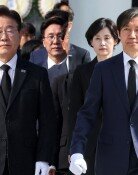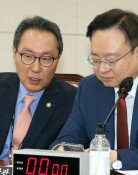Candidate Kim Myung-soo must make the judiciary work for the people
Candidate Kim Myung-soo must make the judiciary work for the people
Posted September. 22, 2017 08:19,
Updated September. 22, 2017 09:28
At the National Assembly Thursday, Kim Myung-soo, the candidate for the Chief Justice of the Supreme Court of Korea, has won 160 votes, which are 10 more votes than the quorum for approval, and has received approval of nomination. It is quite a relief that he can succeed Chief Justice Yang Seung-tae, whose term ends on Sunday, without a gap in terms for the head of the judiciary. Compared to the fierce voting battle between the government party and the opposition parties, he was approved by a wide margin, but the number of votes actually had a narrow margin. As the head of the judiciary, Kim is responsible to dispel some people’s concerns about ideological bias, which was brought out during the process of approval of nomination, and serve as a fair judge who has overcome the battle between the conservative rights and the progressive lefts.
Kim will recommend 10 candidates for the Justices of the Supreme Court of Korea during President Moon Jae-in’s term in office. This is a powerful right in his hands. At the confirmation hearing held by the National Assembly, Kim pledged that he will “exercise recommendation rights, even if the president disagrees.” President Moon nominated jurists with progressive dispositions. For example, he nominated Constitutional Court Justice Kim Yi-soo, who disagreed with the disbandment of the Unified Progressive Party, for the Chief Justice of the Constitutional Court, and he also nominated Lee Yoo-jung, a lawyer from “Lawyers for Democratic Society,” for a constitutional court justice. These two jurists either had the approval rejected by the National Assembly, or had to resign after the suspicion on speculation in stocks surfaced. Kim must not give anyone with preference just because he or she has the same disposition with the president, was once in “Uri Law Research Center” or “Lawyers for Democratic Society.” Also, he must not mistreat anyone for having different dispositions or backgrounds.
The voices inside and out are demanding for the reformation of the court. Kim expressed his willingness, saying, “My biggest wish is to put my efforts in eliminating people’s concerns about unfair trials, caused by the Privileges of Former Post.” The judicial reformation desired by the people is about recovering trust in the trials by eliminating malaise, like the Privileges of Former Post. It is not about abolition of the Judge Promotion System claimed by the national justice conference, or the investigation on “the blacklist of judges.” Of course, the complaints on the congestion of personnel must also be resolved to stabilize the organization of the court. But it must be remembered that the top priorities of reformation are to enhance accessibility of the courts to enhance the quality of the judicial services, and to improve trust in the judicial court with fair trials.
At the age of 58, Kim is relatively young as the Chief Justice of the Supreme Court of Korea. He must demonstrate an open-minded leadership, admitting his lack of experience and knowledge and asking for advices. He has not worked in the Office of Court Administration. It may be his weakness, but based on his career of holding trials for his entire life, he must break out of overgrowing of the Office of Court Administration and bureaucratization of the organization, and carry out systematic reformation, such as dispersion of authority over human resources, which the “mighty chief justice” has the full authority of.
At the appointment ceremony of new judges held in May, Chief Justice Yang Seung-tae quoted the words by French literary master Honoré de Balzac and said, “Distrust in the judiciary is the sign of a society’s end.” Once the judiciary loses trust, it is difficult to recover the trust, and once the function of making judgements is paralyzed, it can lead to chaos and failure of the society. Under Constitution of the Republic of Korea, the judiciary must serve as the last fortress that protects the spirit of the constitution. The independence of the judiciary is being seriously threatened by both the power and the public opinion. Candidate Kim must overcome the battle between the Left and the Right and make the judiciary into a righteous organization, in which the law and the common sense are victorious. That is the way to protect the independence of the judiciary, and the value that the head of the judiciary must protect at the risk of his position.
Headline News
- Israel prepares for retaliation against Iran
- Samsung reclaims top spot, surpassing Apple in smartphone market
- 77% of Koreans in 20s and 30s are 'Kangaroo Tribe' due to job crisis
- KBO referees embroiled in controversy over ABS decision concealment
- Inflation, oil price surge put double shock on global economy







